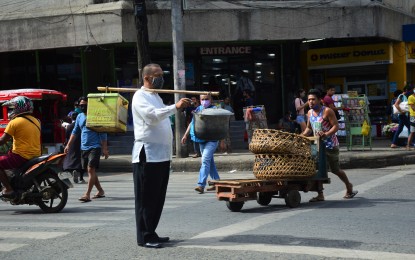
SACRED VOTE. Local artist Nicolas Aca appeals to passersby not to sell their votes through his street advocacy in Cagayan de Oro on Saturday (May 7, 2022). He laments qualified candidates won’t win because they don’t have enough funds to run their campaign. (PNA photo by Jigger Jerusalem)
CAGAYAN DE ORO CITY – Wearing a long-sleeved white Barong Tagalog, slacks, and black shoes, Nicolas “Nic” Aca looks odd standing in the middle of J.R. Borja Street, one of the busiest thoroughfares here.
The 53-year-old multitalented artist could be mistaken for a politician or a lawyer.
On Saturday morning, Aca was carrying on his shoulder a small bamboo pole where a cooking pot hangs from one end and a discarded ballot box on the other.
“Boto dili ibaligya (Don’t sell your votes)," he repeatedly told passersby while he stood under the heat of the sun and amid the danger of being run over on the four-lane road beside the Cogon public market.
Currently the resident artist and gallery curator at the Capitol University’s Museum of Three Cultures and chairperson of the City Historical and Cultural Commission, Aca said he has been holding his street version of voter’s education for the past five elections starting in 2004.
In previous elections, Aca would roam the corners of the city’s business district.
There were times that he would stand outside the St. Augustine Metropolitan Cathedral, meeting devotees going in and out of the church.
Aca has also marched with journalists in condemning media killings in the past.
“This is my way of appealing to the people not to sell their votes,” Aca said.
No ‘ulan-ulan’ to buy votes
The artist said there are candidates who are highly qualified but won’t make it on election day because they don’t have money to give away to voters.
“There are many deserving candidates who I know can serve the people better, but the electorate won’t even give them a second glance since they cannot provide for the ulan-ulan. Their political career won’t take off just because of that – they have no money,” Aca said.
Ulan-ulan (drizzle) is slang here for cash given by political candidates to voters the night before the elections, usually delivered door-to-door by campaign workers.
He lamented that in today’s political landscape, only those who are financially capable to mount a campaign have bigger chances of winning.
What makes it worse, Aca said, is the Filipino culture of utang na loob (debt of gratitude), with voters obligated to pick those who gave them money.
“This has become a cancer and I hope that the next generation will not adopt this practice. We must change it,” he added.
Aca said money given to voters will not last long.
“Juan dela Cruz is given PHP500 to PHP1,000 by the politician. That is only equivalent to a goto (porridge),” he said.
The cooking pot symbolizes goto and the used ballot box is a reminder to exercise the right to vote.
Corruption
Nestor Sablaon, a food vendor at the Cogon public market, agrees with Aca’s advocacy.
“We must not sell our vote because it is sacred and we must choose the right candidates, from the barangay (village) officials to the President,” Sablaon said in the vernacular.
He said vote-buying is a form of corruption that must be stopped.
“We must not wait for ulan-ulan and ayuda (government aid). We must do away with them. Most of us can still eat three times a day, even with just bulad (dried fish) and ginamos (salted fish),” Sablaon said.
If only people will strive harder, there would be no need to depend on politicians for help, he added. (PNA)
